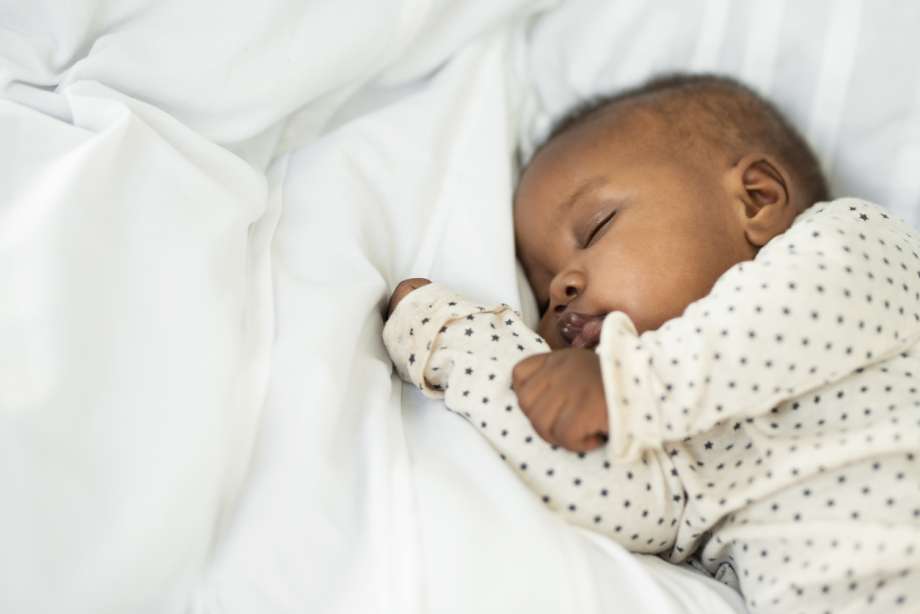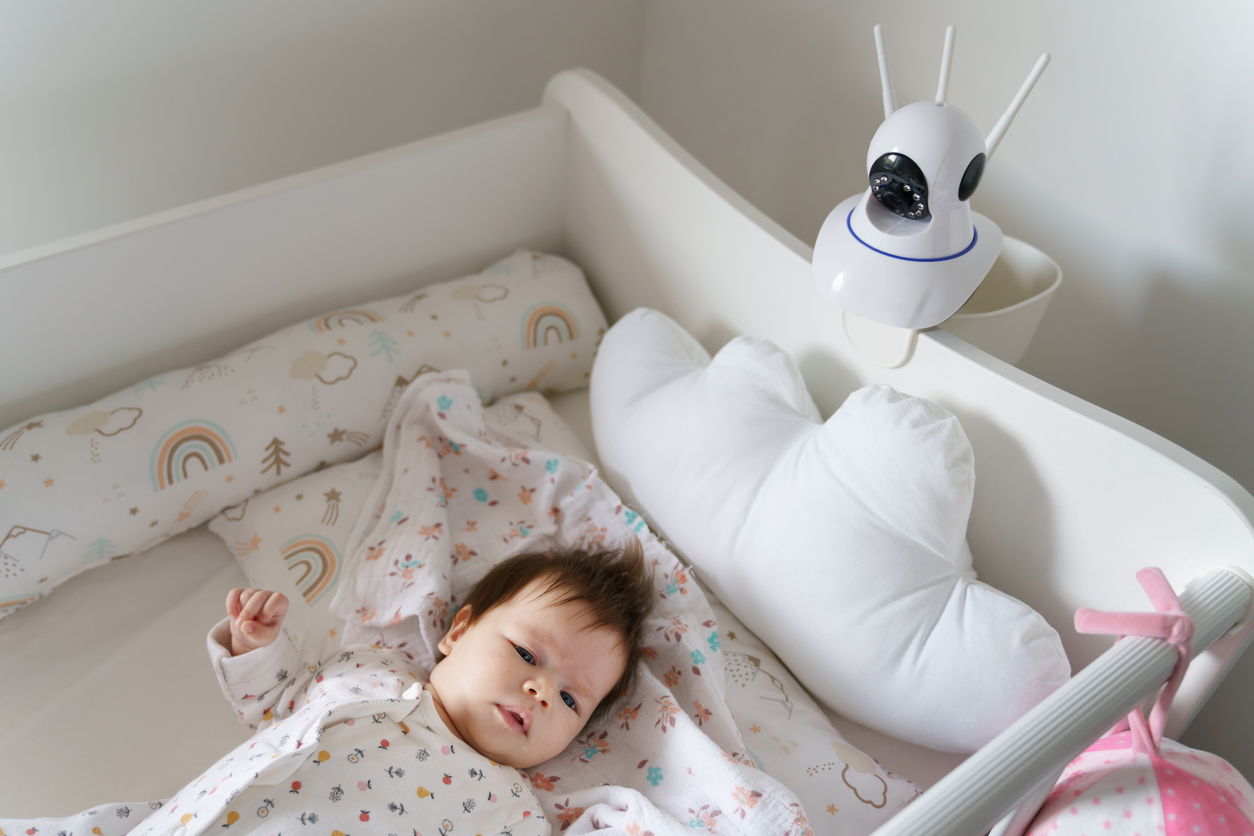A Guide to Baby White Noise

What are the different types of baby white noise, is it effective, is it safe for babies to fall asleep to, and where can you buy a white noise machine? We have all the answers.
What Is White Noise?
According to the Sleep Foundation, white noise is “noise that contains all frequencies across the spectrum of audible sound in equal measure.” It’s also referred to as broadband noise.
What Is It Used For?
In the context of putting babies to sleep, white noise can be used to create soothing background noises that mimic womb sounds and block disruptive sources of noise such as traffic.
It’s common for baby registries to include white noise machines that are designed for infants. These often play white noise that has lullabies incorporated into them; there is also usually an option to play heartbeat sounds that can comfort babies since it can help them feel like they are back in their mother’s womb.
Adults also often use white noise, most commonly for sleeping, during flights, or at times of focus and relaxing activities such as meditation, yoga, and breathing techniques.
How Can I Create White Noise?
Some examples of household items that naturally make white noise when in use include untuned radios, air conditioners, dishwashers, radiators, and fans. There are also apps and machines that are designed to play white noise.
What’s the Science Behind Why It Works?
White noise can be a calming background sound because each frequency of audible sound is played at the same volume. There are no jumps in loudness or softness that can potentially arouse and disrupt the mind when it’s trying to calm down. It’s a noise that remains the same and stays steady in volume.
How Does White Noise Impact a Baby's Sleep?

In 1990, a randomized trial looked at whether white noise could help babies sleep. It studied two groups of newborns, one that was offered white noise to help with sleep and one that was not. It found that 80% of the newborns were able to fall asleep within five minutes after white noise was played compared to only 25% of newborns that fell asleep on their own. The study concluded that white noise can potentially help babies fall asleep faster.
When a baby is in the womb, it is exposed to many different sounds. From the steady beating of mom’s heart, air moving in and out of her lungs, blood flowing from one part of the body to another, to the gurgling of digestive sounds, those noises can surprisingly be even louder than a vacuum cleaner.
When a baby is born, they immediately experience a varying range of noises that are random and chaotic, unlike the predictable whooshing sounds they hear in their mother’s womb. This sudden change in environment can be distressing or unsettling for a newborn – as their minds and bodies adjust, it may be difficult for them to fall asleep in their new surroundings.
It is suggested that baby white noise can help mimic those whooshing sounds of the womb that infants heard while in utero for nine months. It can be comforting and can help babies fall asleep as it reminds them of their time in the womb.
In addition, baby white noise or baby sleep sounds can help a baby stay asleep. A baby’s sleep cycle is not the same as ours. The length of their light sleep and deep sleep is shorter. Specifically, every twenty minutes they transition between light and deep sleep. They can wake up very easily during light sleep.
For instance, sudden noises such as quick footsteps, a car honking, a sibling’s tantrum, or the beeping of a microwave can interrupt their sleep. However, relaxing white noise can act as a sleep aid that helps block these unwanted sounds, preventing a baby from waking up in the middle of the night during these light sleep periods.
Advantages of Baby White Noise
There are some benefits of white noise for babies. It can help reduce unwanted sounds in the home and promote a more sleep-worthy environment.
It Can Help Some Babies Fall Asleep Quicker
As the study proved, for some babies, white noise can help them fall asleep faster. This is especially true for babies who tend to fuss a lot and have a hard time falling asleep; white noise can help create a comforting and relaxing environment.
It Can Mask Unwanted Noise
Depending on your family situation and where you live, it’s impossible to remove all background noises.
For instance, if you live on a busy street, on the ground floor, or in the city, certain loud noises will be difficult to eliminate. Babies don’t only sleep at night. They take naps during the day when outside noise is at its greatest, with incoming and outgoing traffic, garbage trucks, barking dogs, construction crews, motorcycles, fire trucks, police cars, and ambulances.
Or if there are older siblings in the home, they may make it challenging to create a quiet environment that helps the baby sleep.
Lastly, if your baby occasionally sleeps at a grandparent’s home or at another caregiver's home, it may have different background noises that they aren’t familiar with. In these situations, it might be helpful to create a quiet sleeping environment by reducing unwanted noises with a sound machine.
Disadvantages of Baby White Noise
The Infant May Become Dependant on White Noise
If a baby always falls asleep to white noise, they may become reliant on it. This can cause issues when white noise isn’t available or if the baby is at a place where it’s not possible to play white noise. For instance, if they are traveling, being taken care of by someone else, or at daycare, white noise may not be a practical option.
It will be difficult for the baby to fall asleep and stay asleep during these situations. New parents will always need to remember to have the device on hand which adds unnecessary stress to an already challenging time.
White Noise May Not Be Effective
Lastly, you’ve probably had a friend tell you that a hot cup of chamomile tea works like a charm in helping them fall asleep; however, when you tried it, you’re laying in bed wondering why it didn’t work for you.
That’s because everyone’s needs are different, and every baby’s needs are different. Your baby may not like white noise; it may not help them fall asleep at all. It simply doesn’t work for everyone.
Therefore, the most important thing to consider when trying to help your baby sleep is to do it safely, pay attention to their cues and cater to their needs. Some babies can fall asleep after a warm bath and others need mom or dad to sing a lullaby while rocking them. It may be a trial-and-error process to find out what your baby’s sleep needs are. Plus, they are constantly changing, growing, and developing.
Remember to always consult with your pediatrician if you have any questions about your baby’s development, sleep, or other concerns.
Is Baby White Noise Safe?
Before using white noise to help your baby sleep, it’s important to consider some of the potential risks. White noise may not be safe for babies under certain conditions.
White Noise May Cause Damage to a Baby’s Hearing
The American Academy of Pediatrics (AAP) published a study in 2014 that looked at the safety of white noise machines designed for infants. Specifically, they wanted to understand whether the consistent use of these devices can increase the risk of noise-induced hearing loss among infants.
They assessed 14 different types of white noise devices, played them at the highest volumes, and measured their sound levels at 30cm, 100cm, and 200cm. The study found that the maximum sound levels for all the machines placed at 30cm were greater than the recommended noise standards (50 decibels) for infants in hospital nurseries.
The AAP concluded that consistent use of white noise machines may be potentially damaging to infant hearing and auditory development. Therefore, it is recommended that sleep machines or white noise devices should not be positioned less than 200cm (7 feet) from a sleeping baby. The volume should also never be at the maximum setting – anything greater than 50 decibels could cause harm to a baby’s hearing.
The Best White Noise Machines
Before buying a white noise machine or an infant sleep machine, it’s important to understand what to look for.
There are many different types of white noise machines out there. They can be purchased online or in-store. Be sure to review the type of features such as different sound options, whether it’s battery operated, automatic, or remotely shut off, and take a look at the parental controls. If your family travels frequently, look for a smaller machine that is portable and easy to pack.
Here are some white noise machines that we like:
MediAcous White Noise Machine (Amazon)
Features
- Suitable for adults, kids, and babies
- Portable sound machine with 18 high-fidelity soothing sounds
- Four timer settings
- USB baby sound machine with night light
- Memory function for bedroom
Skip Hop Baby Soother, Moonlight & Melodies, Owl (Amazon)
Features
- Projects starry night-scape onto any surface
- Glowing nightlight belly with dimmer control
- Four melodies & nature sounds
- Parental controls include a combination of lights and sounds, auto-off timer: sets for 15, 30, or 60 minutes or continuous play & volume control
Yogasleep Rohm Portable White Noise Machine for Travel (Amazon)
Features
- Three soothing sounds: bright white noise, deep white noise, or gentle surf
- Volume settings from whisper-quiet to impressively robust
- USB rechargeable (USB cable included)
HoMedics SS-2000G/F-AMZ Sound Spa Relaxation Machine (Amazon)
Features
- Six nature sounds: white noise, thunder, ocean, rain, summer night and brook
- 15, 30 and 60-minute auto-off timer
- Battery or adapter operated (adapter included)
Final Tips to Aid Your Baby's Sleep

If you can’t find a white noise sound that works for you and your baby, there are other sounds that can help soothe crying infants and help them drift off into sleep.
- Try using household sounds such as a running fan, vacuum cleaner, or hairdryer.
- Research relaxing music or sleep music. Some parents find that playing their infant classical music such as Mozart does the trick.
Ultimately, sleep is an important part of your baby’s growth and development. However, white noise is not the only solution when it comes to those challenging sleepless nights.
There are safety precautions to consider when using a white noise device. Stick to a low volume and place the device far away from your little one to reduce the risk of hearing damage.
If you have any concerns about your baby’s sleep patterns, speak with your child’s healthcare provider or pediatrician.

